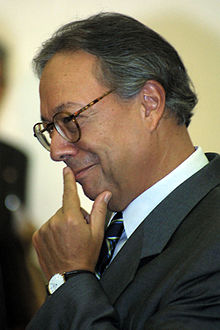Pedro Malan
| Pedro Malan | |
|---|---|
 |
|
| Minister of Finance | |
|
In office 1 January 1995 – 1 January 2003 |
|
| President | Fernando Henrique Cardoso |
| Preceded by | Ciro Gomes |
| Succeeded by | Antonio Palocci |
| President of the Central Bank of Brazil | |
|
In office 9 September 1993 – 31 December 1994 |
|
| Nominated by | Itamar Franco |
| Preceded by | Paulo César Ximenes |
| Succeeded by | Gustavo Franco |
| Personal details | |
| Born |
19 February 1943 Petropolis, Rio de Janeiro, Brazil |
| Alma mater |
Pontifical Catholic University of Rio de Janeiro University of California, Berkeley |
Pedro Sampaio Malan (born 1943 in Rio de Janeiro) is a Brazilian economist and former Minister of Finance for Brazil. He is father of journalist and correspondent Cecília Malan, currently standing at Rede Globo.
Pedro Sampaio Malan was born in 1943 in Petropolis, a town named in honor of Dom Pedro II to the north of Rio de Janeiro. Malan was educated in a Jesuit school before studying electrical engineering at the Pontifícia Universidade Católica do Rio de Janeiro.
While working as a research associate at Rio's Institute of Applied Economic Research he first met the U.S. economics teacher Albert Fishlow, who would in 1973 be his adviser for his doctorate in economics from the University of California, Berkeley. His thesis was Brazil's Place in the International Economy.
Malan continued to live in the USA working for various multilateral agencies until 1993.
Malan returned to Brazil in 1993 at the request of the then finance minister Fernando Henrique Cardoso, who asked him to head the Central Bank. Malan was President of the Brazilian Central Bank, from September 9, 1993 to December 31, 1994.
Malan was the Minister of Finance for Brazil, from January 1, 1995 to December 31, 2002, during the presidency of Fernando Henrique Cardoso. Along with Marcílio Marques Moreira, Malan worked for the Fernando Collor de Mello administration as an official negotiator of the foreign debt of Brazil with the International Monetary Fund. He is credited with successfully reforming the nation's banking system, saving Brazil from the negative effects of 1997's Asian market crisis.
...
Wikipedia
